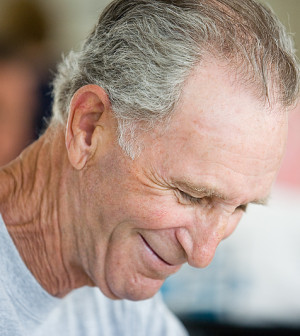- Could Your Grocery Store Meat Be Causing Recurring UTIs?
- Are You Making This Expensive Thermostat Error This Winter?
- Recognizing the Signs of Hypothyroidism
- 10 Strategies to Overcome Insomnia
- Could Artificial Sweeteners Be Aging the Brain Faster?
- Techniques for Soothing Your Nervous System
- Does the Water in Your House Smell Funny? Here’s Why
- Can a Daily Dose of Apple Cider Vinegar Actually Aid Weight Loss?
- 6 Health Beverages That Can Actually Spike Your Blood Sugar
- Treatment Options for Social Anxiety Disorder
For Aging Blacks, ‘Golden Years’ Often Marred by Disability

While Americans are living longer than ever, a new study finds there’s still an important racial gap in health: Older black people are more likely than older white people to live their final years with disabilities.
“In 2011, at age 65, whites could expect to be free of disability for 15 out of their nearly 20 remaining years of life — about three-fourths of the time,” said study lead author Vicki Freedman.
In contrast, “blacks could expect to live 12 out of 18 years — or about two-thirds of remaining years of life — without disability. The gap was a similar size in 1982,” she said.
Freedman is a research professor with the University of Michigan’s Institute for Social Research.
It’s not clear why this difference exists, but the study authors said older black women seem particularly at risk.
“The gaps persisted in part because of the lack of progress for older black women in gaining years of active life,” Freedman said. “Why this group has lost ground is not clear. A better understanding of the root causes occurring earlier in life, particularly those that disadvantage black women, is needed.”
The study included information from national surveys and studies from three points in time. The 1982 information included about 18,000 whites and more than 1,500 blacks. In 2004, the researchers had information from around 14,000 whites and more than 1,000 blacks. In 2011, the study included nearly 6,000 whites and 2,000 blacks.
All of the participants were 65 or older. They answered questions about whether a disability or health problem kept them from doing things without assistance, such as eating, getting in or out of bed, getting in or out of chairs, dressing, bathing, using the toilet, preparing meals and managing money.
Life span — the expected number of years that people would live beyond the age of 65 — rose from 1982 to 2011 for both whites and blacks, the researchers said.
From 1982 to 2011, whites gained nearly three years of life without disability, while blacks got 2.2 additional years, the study noted.
But a larger gap persisted between the years that whites and blacks could expect to live without a disability and the number of years they could expect to live. In 1982, the gap was 74 percent for whites and 65 percent for blacks. That means that 74 percent of the remaining years for whites could be expected to be disability-free, while just 65 percent of remaining years would be disability-free for blacks, the study showed.
By 2011, the gap was 76 percent for whites and 67 percent for blacks, the researchers reported.
The researchers found that 22 percent of whites over 65 had a disability in 2011, compared to 32 percent of blacks. For instance, 18 percent of blacks in 2011 had trouble shopping for groceries compared to 11 percent of whites.
The statistics used by the researchers didn’t allow them to determine levels of disability among people of differing ethnic groups.
Dr. Marshall Chin, a professor of Healthcare Ethics at the University of Chicago, is familiar with the study findings and had some theories as to why this disability disadvantage exists.
“These disparities reflect a lifetime of disadvantage,” Chin said. “Compared to whites, African-Americans have worse education, lower income and fewer social ties, all leading to worse health.
“African-Americans are more likely to lack health insurance, and even when they do receive care it is more likely to be of inferior quality. Finally, for older people, the U.S. health system puts its money into treating diseases rather than keeping people healthy and strong,” he added.
Black women, in particular, may face unique pressures, said Christopher King. He’s program director and assistant professor of Health Systems Administration at Georgetown University in Washington, D.C.
Black women are more likely than other women to be heads of their households, and “the heavy demands and competing priorities associated with this responsibility cause some women to forgo their own health needs to take care of others,” King said.
This, he said, can lead them to not seek preventive medical services or not get illnesses diagnosed early — or both.
What to do?
Among other things, King said communities must make it easier for older people to live safely at home through strategies like supporting caregivers and preventing falls inside homes.
The study appears in the August issue of the journal Health Affairs.
More information
For details about health disparities affecting blacks, visit the NAACP.
Source: HealthDay
Copyright © 2026 HealthDay. All rights reserved.










